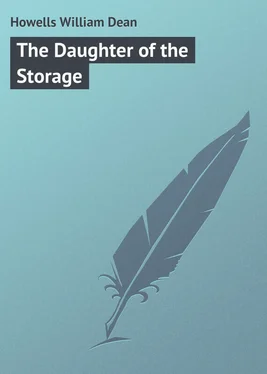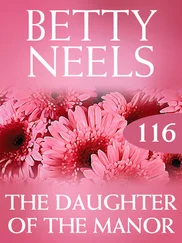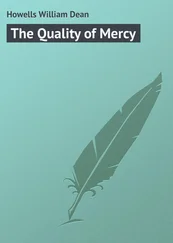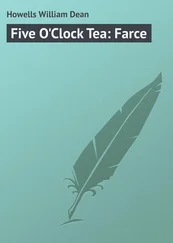William Howells - The Daughter of the Storage
Здесь есть возможность читать онлайн «William Howells - The Daughter of the Storage» — ознакомительный отрывок электронной книги совершенно бесплатно, а после прочтения отрывка купить полную версию. В некоторых случаях можно слушать аудио, скачать через торрент в формате fb2 и присутствует краткое содержание. ISBN: , Жанр: Поэзия, foreign_prose, foreign_poetry, foreign_language, на английском языке. Описание произведения, (предисловие) а так же отзывы посетителей доступны на портале библиотеки ЛибКат.
- Название:The Daughter of the Storage
- Автор:
- Жанр:
- Год:неизвестен
- ISBN:http://www.gutenberg.org/ebooks/30023
- Рейтинг книги:3 / 5. Голосов: 1
-
Избранное:Добавить в избранное
- Отзывы:
-
Ваша оценка:
- 60
- 1
- 2
- 3
- 4
- 5
The Daughter of the Storage: краткое содержание, описание и аннотация
Предлагаем к чтению аннотацию, описание, краткое содержание или предисловие (зависит от того, что написал сам автор книги «The Daughter of the Storage»). Если вы не нашли необходимую информацию о книге — напишите в комментариях, мы постараемся отыскать её.
The Daughter of the Storage — читать онлайн ознакомительный отрывок
Ниже представлен текст книги, разбитый по страницам. Система сохранения места последней прочитанной страницы, позволяет с удобством читать онлайн бесплатно книгу «The Daughter of the Storage», без необходимости каждый раз заново искать на чём Вы остановились. Поставьте закладку, и сможете в любой момент перейти на страницу, на которой закончили чтение.
Интервал:
Закладка:
II
A PRESENTIMENT
Over our coffee in the Turkish room Minver was usually a censor of our several foibles rather than a sharer in our philosophic speculations and metaphysical conjectures. He liked to disable me as one professionally vowed to the fabulous, and he had unfailing fun with the romantic sentimentality of Rulledge, which was in fact so little in keeping with the gross super-abundance of his person, his habitual gluttony, and his ridiculous indolence. Minver knew very well that Rulledge was a good fellow withal, and would willingly do any kind action that did not seriously interfere with his comfort, or make too heavy a draft upon his pocket. His self-indulgence, which was quite blameless, unless surfeit is a fault, was the basis of an interest in occult themes, which was the means of even higher diversion to Minver. He liked to have Rulledge approach Wanhope from this side, in the invincible persuasion that the psychologist would be interested in these themes by the law of his science, though he had been assured again and again that in spite of its misleading name psychology did not deal with the soul as Rulledge supposed the soul; and Minver's eyes lighted up with a prescience of uncommon pleasure when, late one night, after we had vainly tried to hit it off in talk, now of this, now of that, Rulledge asked Wanhope, abruptly as if it followed from something before:
"Wasn't there a great deal more said about presentiments forty or fifty years ago than there is now?"
Wanhope had been lapsing deeper and deeper into the hollow of his chair; but he now pulled himself up, and turned quickly toward Rulledge. "What made you think of that?" he asked.
"I don't know. Why?"
"Because I was thinking of it myself." He glanced at me, and I shook my head.
"Well," Minver said, "if it will leave Acton out in the cold, I'll own that I was thinking of it, too. I was going back in my mind, for no reason that I know of, to my childhood, when I first heard of such a thing as a presentiment, and when I was afraid of having one. I had the notion that presentiments ran in the family."
"Why had you that notion?" Rulledge demanded.
"I don't know that I proposed telling," the painter said, giving himself to his pipe.
"Perhaps you didn't have it," Rulledge retaliated.
"Perhaps," Minver assented.
Wanhope turned from the personal aspect of the matter. "It's rather curious that we should all three have had the same thing in mind just now; or, rather, it is not very curious. Such coincidences are really very common. Something must have been said at dinner which suggested it to all of us."
"All but Acton," Minver demurred.
"I mightn't have heard what was said," I explained. "I suppose the passing of all that sort of sub-beliefs must date from the general lapse of faith in personal immortality."
"Yes, no doubt," Wanhope assented. "It is very striking how sudden the lapse was. Everyone who experienced it in himself could date it to a year, if not to a day. The agnosticism of scientific men was of course all the time undermining the fabric of faith, and then it fell in abruptly, reaching one believer after another as fast as the ground was taken wholly or partly from under his feet. I can remember how people once disputed whether there were such beings as guardian spirits or not. That minor question was disposed of when it was decided that there were no spirits at all."
"Naturally," Minver said. "And the decay of the presentiment must have been hastened by the failure of so many presentiments to make good."
"The great majority of them have failed to make good, from the beginning of time," Wanhope replied.
"There are two kinds of presentiments," Rulledge suggested, with a philosophic air. "The true and the untrue."
"Like mushrooms," Minver said. "Only, the true presentiment kills, and the true mushroom nourishes. Talking of mushrooms, they have a way in Switzerland of preserving them in walnut oil, and they fill you with the darkest forebodings, after you've filled yourself with the mushrooms. There's some occult relation between the two. Think it out, Rulledge!"
Rulledge ignored him in turning to Wanhope. "The trouble is how to distinguish the true from the untrue presentiment."
"It would be interesting," Wanhope began, but Minver broke in upon him maliciously.
"To know how much the dyspepsia of our predecessors had to with the prevalence of presentimentalism? I agree with you, that a better diet has a good deal to do with the decline of the dark foreboding among us. What I can't understand is, how a gross and reckless feeder, like Rulledge here, doesn't go about like ancestral voices prophesying all sorts of dreadful things."
"That's rather cheap talk, even for you, Minver," Rulledge said. "Why did you think presentiments ran in your family?"
"Well, there you have me, Rulledge. That's where my theory fails. I can remember," Minver continued soberly, "the talk there used to be about them among my people. They were serious people in an unreligious way, or rather an unecclesiastical way. They were never spiritualists, but I don't think there was one of them who doubted that he should live hereafter; he might doubt that he was living here, but there was no question of the other thing. I must say it gave a dignity to their conversation which, when they met, as they were apt to do at one another's houses on Sunday nights, was not of common things. One of my uncles was a merchant, another a doctor; my father was a portrait-painter by profession, and a sign-painter by practice. I suppose that's where I got my knack, such as it is. The merchant was an invalid, rather, though he kept about his business, and our people merely recognized him as being out of health. He was what we could call, for that day and region – the Middle West of the early fifties – a man of unusual refinement. I suppose this was temperamental with him largely; but he had cultivated tastes, too. I remember him as a peculiarly gentle person, with a pensive cast of face, and the melancholy accomplishment of playing the flute."
"I wonder why nobody plays the flute nowadays," I mused aloud.
"Yes, it's quite obsolete," Minver said. "They only play the flute in the orchestras now. I always look at the man who plays it and think of my uncle. He used to be very nice to me as a child; and he was very fond of my father, in a sort of filial way; my father was so much older. I can remember my young aunt; and how pretty she was as she sat at the piano, and sang and played to his fluting. When she looked forward at the music, her curls fell into her neck; they wore curls then, grown-up women; and though I don't think curls are beautiful, my aunt's beauty would have been less without them; in fact, I can't think of her without them.
"She was delicate, too; they were really a pair of invalids; but she had none of his melancholy. They had had several children, who died, one after another, and there was only one left at the time I am speaking of. I rather wonder, now, that the thought of those poor little ghost-cousins didn't make me uncomfortable. I was a very superstitious boy, but I seem not to have thought of them. I played with the little girl who was left, and I liked going to my uncle's better than anywhere else. I preferred going in the daytime and in the summer-time. Then my cousin and I sat in a nook of the garden and fought violets, as we called it; hooked the wry necks of the flowers together and twitched to see which blossom would come off first. She was a sunny little thing, like her mother, and she had curls, like her. I can't express the feeling I had for my aunt; she seemed the embodiment of a world that was at once very proud and very good. I suppose she dressed fashionably, as things went then and there; and her style as well as her beauty fascinated me. I would have done anything to please her, far more than to please my cousin. With her I used to squabble, and sometimes sent her crying to her mother. Then I always ran off home, but when I sneaked back, or was sent for to come and play with my cousin, I was not scolded for my wickedness.
Читать дальшеИнтервал:
Закладка:
Похожие книги на «The Daughter of the Storage»
Представляем Вашему вниманию похожие книги на «The Daughter of the Storage» списком для выбора. Мы отобрали схожую по названию и смыслу литературу в надежде предоставить читателям больше вариантов отыскать новые, интересные, ещё непрочитанные произведения.
Обсуждение, отзывы о книге «The Daughter of the Storage» и просто собственные мнения читателей. Оставьте ваши комментарии, напишите, что Вы думаете о произведении, его смысле или главных героях. Укажите что конкретно понравилось, а что нет, и почему Вы так считаете.












